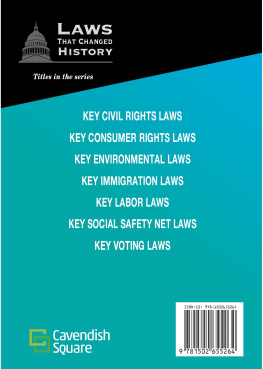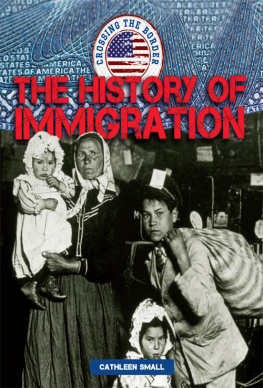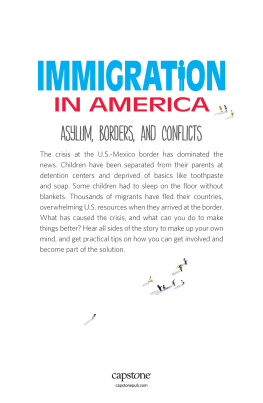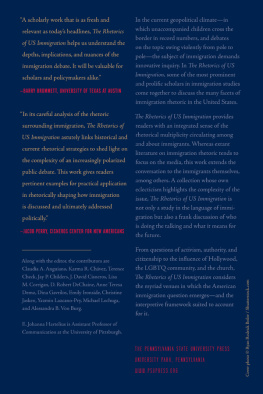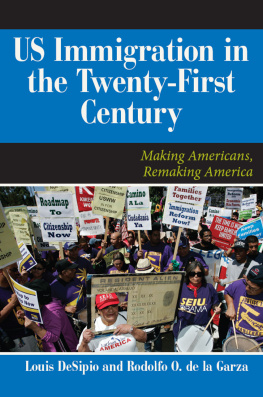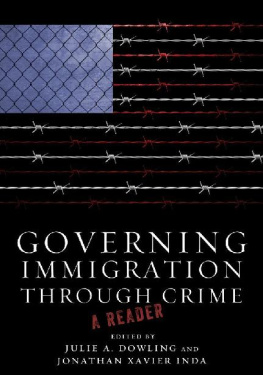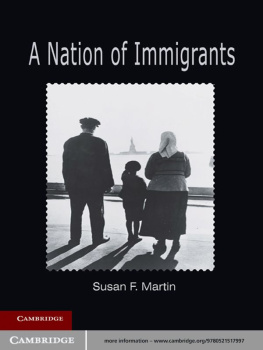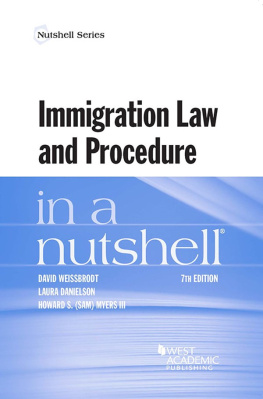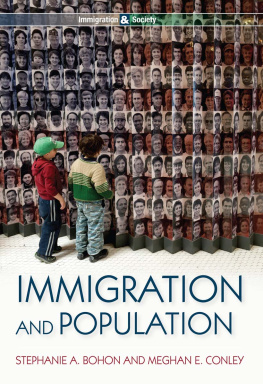The Rhetorics of US Immigration
The Rhetorics of US Immigration
Identity, Community, Otherness
Edited by E . Johanna Hartelius
The Pennsylvania State University Press
University Park, Pennsylvania
Library of Congress
Cataloging-in-Publication Data
The rhetorics of US immigration : identity, community, otherness / edited by E. Johanna Hartelius.
pagescm
Summary: Examines U.S. immigration as a rhetorical process inventing persons and communities in reference to space and place. Engages immigration in media and popular culture; the construction of immigrant experiences in public discourse; and the effects of fear, violence, and exclusion on immigrant and non-immigrant communitiesProvided by publisher.
Includes bibliographical references and index.
ISBN 978-0-271-06718-6 (cloth : alk. paper)
1. United StatesEmigration and immigration.
2. RhetoricUnited States.
I. Hartelius, E. Johanna, 1979, editor.
JV 6465. R 44 2015
304.873dc23 2015008147
Copyright 2015
The Pennsylvania State University
All rights reserved
Printed in the United States of America
Published by
The Pennsylvania State University Press,
University Park, PA 168021003
The Pennsylvania State University Press
is a member of the
Association of American University Presses.
It is the policy of The Pennsylvania State University Press to
use acid-free paper. Publications on uncoated stock satisfy
the minimum requirements of American National Standard
for Information SciencesPermanence of Paper for
Printed Library Material, ansi z39.481992.
CONTENTS
Introduction
E. Johanna Hartelius
Part 1:
Activism and Public Campaigns
1 / Facing Ghosts, God, and Nature: Affect, Naturalization, and the No Ms Cruces Border Campaign
Terence Check and Christine Jasken
2 / Faithful Sovereignty: Denationalizing Immigration Policy in the 2003 Pastoral Letter on Migration
Anne Teresa Demo
3 / Protecting LGBT Migrants: The Rhetoric of Identity and the Expansion of the Prison-Industrial Complex
Karma R. Chvez
Part 2:
Identity Struggles and Dreamers
4 / Dropping the I-Word: A Critical Examination of Contemporary Immigration Labels
Claudia A. Anguiano
5 / American Childrens Success and Global Competitiveness: The Racial Paradox of Bilingualism as Cultural Capital
Dina Gavrilos
6 / Documenting Dreams: A Rhetorical Performance of Inclusive Citizenship and Collaborative Expertise
Yazmin Lazcano-Pry
Part 3:
(Hi)stories of Exclusion
7 / Constituting Enemies Through Fear: The Rhetoric of Exclusionary Nationalism in the Control of Un-American Immigrant Populations
Emily Ironside and Lisa M. Corrigan
8 / Defining the Right Sort of Immigrant: Theodore Roosevelt and American Character
Jay P. Childers
9 / Immigration as Histories of Mob-ility: Personal Storytelling in the Where Are You From? Project
Alessandra B. Von Burg
Part 4:
Affect and Media Imagery
10 / Battling Identity Warfare on the Imagined US/Mxico Border: Performing Migrant Alien in Independence Day and Battle: Los Angeles
Michael Lechuga
11 / Affect, Emotion, and Immigration Rhetoric, or What Happens When a Minuteman Lives with Unauthorized Immigrants?
J. David Cisneros
Afterword: Tracking the Shifting Borders of Identity and Otherness; Productive Complications and Ethico-Political Commitments
D. Robert DeChaine
This volume emerged over the course of several years and in that time assumed multiple forms. What began as an idea for a special issue became a book. A book became a conference panel (Rhetoric Society of America, San Antonio, Texas, 2014). We who kept bumping into one another virtually and in person became a cohort of scholars concerned with the same issue, the rhetorical practices of immigration. As editor, I would like to acknowledge the ingenuity, patience, and dedication of the authors included in this volume; their commitment to scholarship on immigration rhetorics is both remarkable and promising.
Special recognition is owed the scholars whose work on immigration rhetoric in the past few decades has created an interdisciplinary subfield and literature of note: Bernadette Marie Calafell, Karma R. Chvez, J. David Cisneros, D. Robert DeChaine, Fernando P. Delgado, Anne Teresa Demo, Lisa A. Flores, Marouf A. Hasian, Michelle A. Holling, Kent A. Ono, Richard D. Pineda, John M. Sloop, Stacey K. Sowards, and Mary Ann Villareal. DeChaines Border Rhetorics (University of Alabama Press, 2012), which includes work by several of the authors in the present volume, was immeasurably instructive and inspirational. I value DeChaines kind encouragement and prompt professionalism and am thrilled that he agreed to contribute an afterword.
I am grateful to those who offered their expertise in the process of editing, the masters of cat herding: Raymie McKerrow, Angela Ray, Barry Brummett, Marty Medhurst, and Vanessa Beasley.
I thank the Department of Communication at the University of Pittsburgh and the Dietrich School of Arts and Sciences for their generous support in the form of a research fund and a third-term research stipend. I thank the Department of Communication Studies at the University of Texas at Austin for hosting me as a visiting scholar in the summer of 2014.
I much appreciate the indomitable Kendra Boileau, editor-in-chief of Penn State Press.
The authors would like to recognize the contributions of a few important persons and institutions to their projects and chapters: Bruce Campbell; Todd Scribner (PhD), educational outreach coordinator, United States Conference of Catholic Bishops; Rodolfo Hernndez, chief creative officer at Elevacin; and the North Carolina Humanities Council and Wake Forest University for their support of the Where Are You From? Project.
Finally, I thank the two Zs for their joy and love.
Since 2011, the number of unaccompanied minors crossing the US-Mexico border, specifically the Rio Grande Valley, has surged to tens of thousands per year. Between October 2013 and June 2014, more than forty-seven thousand were apprehended by US customs agents, many of them under the age of thirteen.1 Shelter facilities are overburdened and administrators backlogged. The news media report that many of the children leave families behind to escape the violence and coercive recruitment efforts of Central American gangs.2 Many set out to find a parent or relative living in the United States, oftentimes without documentation. This is an international, humanitarian, political, and logistical crisis. Moreover, it is a rhetorical crisis, a matter of enduring mythologies and symbolic classifications with material consequences. The US Customs and Border Protection Agency refers to the young immigrants as unaccompanied alien children;3 the UN Refugee Agency as children on the run.4 With either label, these children illustrate the contingency of immigration on language, and the powerful rhetoric of social (civic and national) imaginaries.
This volume is principally concerned with the fundamental rhetoricity of immigration, analyzing it as a rhetorical process inventing persons and communities with respect to space and place. In this process of invention, the contributors demonstrate, immigrants are constructed as military threats, economic assets, societal burdens, or modern Ellis Island arrivals by border authorities, governmental administrators, corporate agents, and the American public. Our intent with


